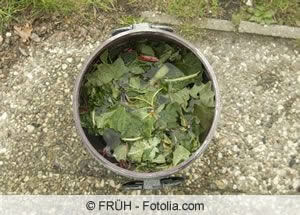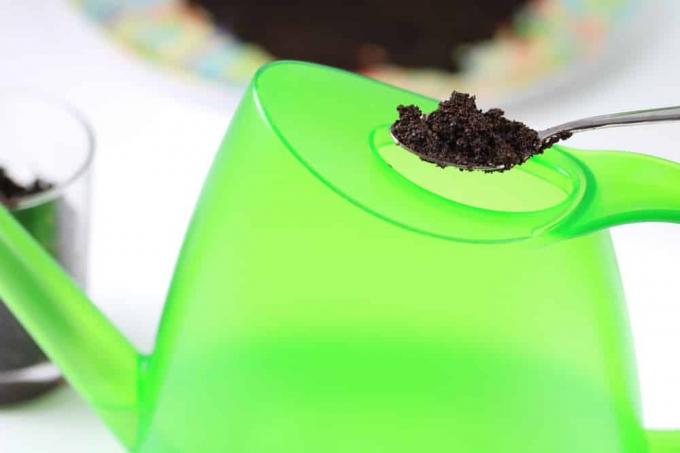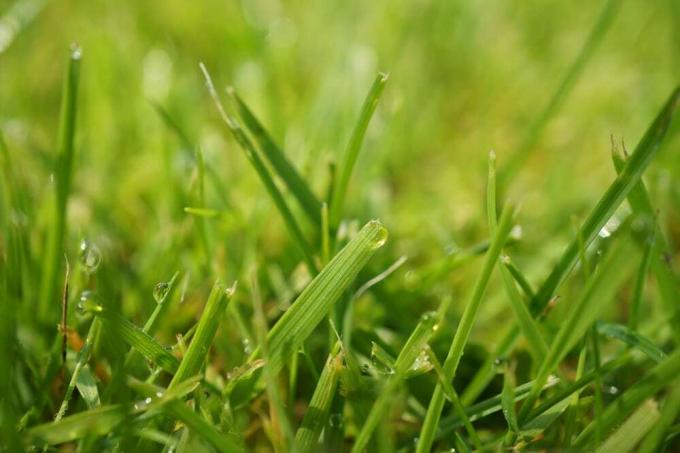

Table of contents
- All benefits at a glance
- Make liquid fertilizer yourself - useful tips
- Plant manure - a natural liquid fertilizer
- Modify compost to liquid fertilizer
- Make liquid flower fertilizer yourself
- Liquid fertilizer for the lawn
- Editor's conclusion
- Worth knowing about liquid fertilizers shortly
In this regard, farmers and hobby gardeners agree; Liquid fertilizer is the future. The list of positive properties compared to solid fertilizer is long and convincing. While mineral preparations continue to be used unconcernedly in commercial plant cultivation, environmentally and health-conscious leisure gardeners favor organic fertilizers. The previous problems of independent production of liquid fertilizer are gradually being resolved thanks to a wealth of experience that has been accumulated. Familiarize yourself with all the advantages of liquid fertilizer here. Benefit from useful tips for crafting.
All benefits at a glance

Providing the plants in the house and garden with the nutrients they need in liquid form only has advantages, even on closer inspection. The following overview shows the central aspects:
- Nutrients are immediately available to the plants
- More even distribution compared to granulate spreaders
- time-consuming raking of granules into the ground is no longer necessary
- there is no formation of harmful dust
- no investment in expensive spreaders required
- more precise dosing possible, accurate to the milliliter
- no risk of chemical burns on dry ground
- thanks to foliar fertilization immediate correction of nutritional disorders
- effective coverage of seasonal demand peaks in the nutrient supply
Plants and gardeners alike benefit from liquid fertilizer. In this context, the aspect of work organization should also be of interest, because the application of solid fertilizer is significantly more dependent on the weather.
Make liquid fertilizer yourself - useful tips
For a long time, nature-loving hobby gardeners faced the problem that they could only get the benefits of liquid fertilizer from commercially available mineral-chemical preparations. The large community of leisure gardeners was not deterred by this circumstance and experimented with natural ingredients until it turned out how to produce liquid compost is. In the meantime, an extensive pool of important findings has emerged as to how liquid fertilizer can be produced for the allotment garden without handling chemical toxins. The following crafting tips provide an outline of the current state of knowledge.
Plant manure - a natural liquid fertilizer
Nettles are rich in nitrogen, comfrey provides plenty of potassium, horsetail broth prevents fungal diseases; the list of plants that have active ingredients is long. With a few simple steps and a little patience, they turn into intensive plant manure, the ideal biological liquid fertilizer for the whole garden. Their production always follows the same principle:
- collect a kilogram of fresh leaves from non-flowering plants
- Mix in a wooden tub with 10 liters of water (rain or pond water).
- cover with chicken wire or a grid to prevent animals from falling inside
- place in a sunny, secluded garden area and stir daily
- after the 14-day fermentation process, strain the mixture
If you have so far avoided the production of liquid manure for plants because of the bad smell, use the following tips to effectively reduce odors:
- add rock flour, bentonite or Humofix with each stirring process
- Chamomile, valerian or oak leaves also have an odor-reducing effect
- additional oxygen from an aquarium pump at the bottom of the tank drives away the stench
You save yourself the hassle of straining out a plant manure after the fermentation process if the plant material is placed in an old curtain or a net in the tub. In this case, the leaves will not be able to clog the aquarium pump.
Tip:
Plant manure is generally used in a very diluted form. As a liquid fertilizer for the root area, the liquid manure is diluted with water at a ratio of at least 1:10. Dilution in a ratio of 1:50 is recommended for foliar fertilization.
Modify compost to liquid fertilizer
Mature compost represents the ultimate organic fertilizer for the kitchen and ornamental garden. All the nutrients a lush growing plant needs are here, without adding the slightest chemical ingredient. Due to its nature, its range of applications was reduced to bedding soil for a long time, where compost is worked in with a rake. So that your potted plants can also enjoy the natural food, turn mature garden compost into liquid fertilizer using the following method:
- Pour 1 liter of sifted compost into a wooden tub.
- Pour 5 liters of water over it and stir.
- Add a spoonful of rock flour to revitalize the microorganisms.
- Stand at the far end of the garden and cover.
After 2 to 3 days, the self-made compost is ready for pouring. To do this, strain the liquid without stirring the mixture again.

Make liquid flower fertilizer yourself
Additional nutrients such as nitrogen, potassium and phosphorus are essential so that the bouquet of flowers in the vase presents its lavish bloom for a long time. The same applies to flowering and evergreen indoor plants. In the service of the environment, hobby gardeners also decide in this case to use liquid fertilizer they produce themselves. The most popular examples:
- Potato water: used as irrigation water when cooled, it releases valuable nutrients
- Stale beer: contains a wealth of nutritious components that unfold with watering
- Baker's yeast: dissolve a fresh cube of yeast in 10 liters of water and water the plants with it
- Cola or coffee: supplies plants in acidic soil with important nutrients and lowers the pH value
- Egg water: used as irrigation water, it supplies calcium and oxygen to the flowers
- Baking soda: once a month 1 tablespoon dissolved in 2 liters of water, ideal for lime-loving plants
You therefore already have a large number of ingredients for liquid fertilizer in the house. In this context, it must not be overlooked that an immediate effect on the flowers and plants is not to be expected. Administered consistently, the desired effect unfolds over time.
Liquid fertilizer for the lawn
A lush green carpet of lawn does not develop without a sophisticated supply of additional nutrients. When using lawn fertilizer in granular form, however, there is always the danger of over-fertilization. With an organic liquid fertilizer you revitalize the grasses without risking chemical burns or burns. Beetroot manure has proven to be extremely effective here. Leave 1 kilogram of leaves and stems to ferment in 10 liters of water for 14 days. Apply this natural lawn fertilizer twice a week, diluted in a ratio of 1:10, after particular hardship or after a new lawn. The green area will recover magnificently and grow densely within a short time.
Editor's conclusion
Liquid fertilizer convinces with powerful advantages, such as a rapid effect and uncomplicated application. In order to enjoy the numerous positive attributes, a hobby gardener is not forced to resort to commercially available mineral preparations. Thanks to simple recipes, compost can be modified into liquid fertilizer, as can nitrogenous stinging nettles or potassium-rich comfrey leaves. The unavoidable stench is significantly reduced by the addition of rock flour or the targeted supply of oxygen using an aquarium pump. Those who shy away from this effort use a wide variety of home remedies to use their nutrients as liquid fertilizer for flowers.
Worth knowing about liquid fertilizers shortly
Liquid fertilizer has the solid fertilizer (eg. B. fertilizer sticks) over the advantage that the fertilizer penetrates directly and immediately into the soil and immediately supplies the roots with nutrients.
phosphic
- The liquid fertilizer Phosfik is a phosphorus and potassium fertilizer for fruit, wine, vegetables and ornamental plants.
- Phosfik ensures a targeted nutrient supply of the cultures with all main and trace elements.
- The liquid fertilizer strengthens the resistance and improves the colour, aroma and taste of the fruit.
- Another advantage is that the liquid fertilizer supports the formation of the plants' own defenses. Phosfik may only be used diluted.
protamine
- Protamin is a liquid fertilizer in which copper is complexed with amino acids and humic acids.
- This means that the plant actually absorbs copper. The organic components promote growth.
- The benefits of the liquid fertilizer Protamin are disease prevention and cell division is promoted.
- The fertilizer is suitable for fruit, vegetables and herbs.
boromine
- Boromin is a new type of liquid fertilizer with ten percent boron based on boron ethanolamine.
- The amino acids it contains increase adhesion and reduce herbicide infestation.
- Boromin is suitable for fertilizing rapeseed, sugar beets, potatoes and vegetables.
Vitalet
- Vitalet is a special foliar fertilizer with highly effective calcium.
- It strengthens the cell wall tissue, has a revitalizing effect and brings significant improvements in quality.
- It provides a targeted supply of nutrients in the event of calcium deficiency symptoms such as internal burns in lettuce, fruit rot in tomatoes and specks in apples.
- Vitalet is particularly suitable for fertilizing salads, for example lamb's lettuce or leaf lettuce.
Rizammina
- Rizammina is a unique organo-mineral fertilizer for efficient foliar fertilization in orchards and vineyards.
- The liquid fertilizer ensures improved fruit and tuber size.
 garden editorial
garden editorial I write about everything that interests me in my garden.
Learn more about fertilizer

Lawn lime: Lime against moss in the lawn
As soon as moss appears in the lawn, many a hobby gardener becomes restless - because soon the moss carpet can take over entire areas. With lawn lime, however, the unwelcome visitor can be skilfully put in his place.

Build your own Bokashi bucket | DIY instructions
Most of the kitchen waste goes on the compost or in the organic bin to add it back to nature's cycle. But there is a way to gain valuable fertilizer beforehand. We show how easy it is to build a Bokashi bucket and use it to obtain liquid fertilizer on the balcony or even in the apartment.

These 8 plants don't like coffee grounds as fertilizer
Hobby gardeners swear by the effect of the coffee grounds. It is fertilizer, snail protection, soil conditioner and cat deterrent all at the same time. In addition, it is free of charge and occurs daily in the household. Most plants are strengthened, but some are sensitive to the addition of coffee. We clarify.

Fertilize Christmas roses properly: 11 effective home remedies
Christmas roses are special flowers because, unlike almost all other perennials, they bloom in winter. They are insensitive and frost-hardy, and they can also multiply independently. Here you can find out what needs to be considered when fertilizing.

Lawn Bokashi: 6 steps to a cheap & natural fertilizer
The name Bokashi is still largely unknown. This method of using grass clippings comes from Japan. With a little preparation and a special form of processing, the clippings become valuable, nutrient-rich fertilizer that can be easily distributed in the garden.

Wood ash as fertilizer | These 70 plants love barbecue and charcoal
Home gardeners with a fireplace or tiled stove receive a natural fertilizer for free. Charcoal and charcoal leave behind a dusty residue that is packed with valuable nutrients. Read here under what conditions wood ash is suitable as a fertilizer. These 70 plants benefit from the unorthodox nutrient supply.
